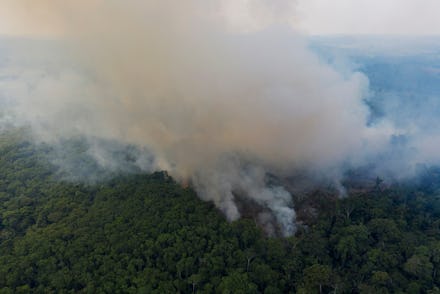The Amazon rainforest could start emitting carbon rather than absorbing it in just 15 years

In 15 years, the Amazon rainforest may lose its ability to absorb carbon dioxide from the atmosphere. The forest in the Amazon has declined more rapidly than other tropical forests in the world, reported a team of researchers, and the trees remaining are struggling to absorb the increasing amount of carbon dioxide (CO2) humans are pumping into the air. By 2035, the Amazon rainforest's ability to take CO2 could be so diminished that it might turn into a carbon source instead of a carbon sink.
The study was conducted by a group of researchers from Europe and Africa who set out to compile data on the rainforests in Africa and the Amazon. They measured and compared the trees' growth and mortality rates, going back as far as 50 years ago, to look for patterns and create predictions. What they found was disheartening: Although young trees grow faster by absorbing a lot of carbon — hence why the forests are considered a carbon sink — tree growth can also be strangled by extreme heat and drought. As temperatures climb, the trees' absorption abilities diminish, basically negating the positive effects of tree growth.
This means we could be losing one of our best allies in the fight against the impacts of climate change. The researchers predict that, by 2035, the Amazon rainforest won't absorb any CO2 at all. If this happens, the leftover forests could end up releasing more CO2 than they can absorb — turning the carbon sink into a carbon source.
"Mortality is a natural part of the cycle of forest trees," said Wannes Hubau, a forest ecosystems expert with Belgium's Royal Museum for Central Africa, to AFP. "However, by pumping so much CO2 in the air, we have accelerated this cycle and blew its magnitude up to unknown proportions." This has created a decreasing rate of absorption that "is decades ahead of what even the most pessimistic climate models predicted."
The absorption issue comes even without addressing logging or other human-related deforestation practices. It can be a serious problem, the research team warned, because many climate change policies depend on the carbon absorbing ability of the Earth's large Amazonian and African forests. The Amazon rainforest alone absorbs at least 2 billion tons of CO2 each year. Even the Paris Agreement was drafted with the assumption that forests all over the globe will always be able to help us suck CO2 from the air.
This study has provided evidence that we may have already screwed the pooch on that one. Unless more nations push to reduce the speed of global warming, temperatures will only end up rising at an accelerated rate, diminishing the forests' absorption ability even further (or faster).
The researchers' findings mean global leaders "will have to rethink the climate models," said Hubau, as well as "climate mitigation strategies based on those models."